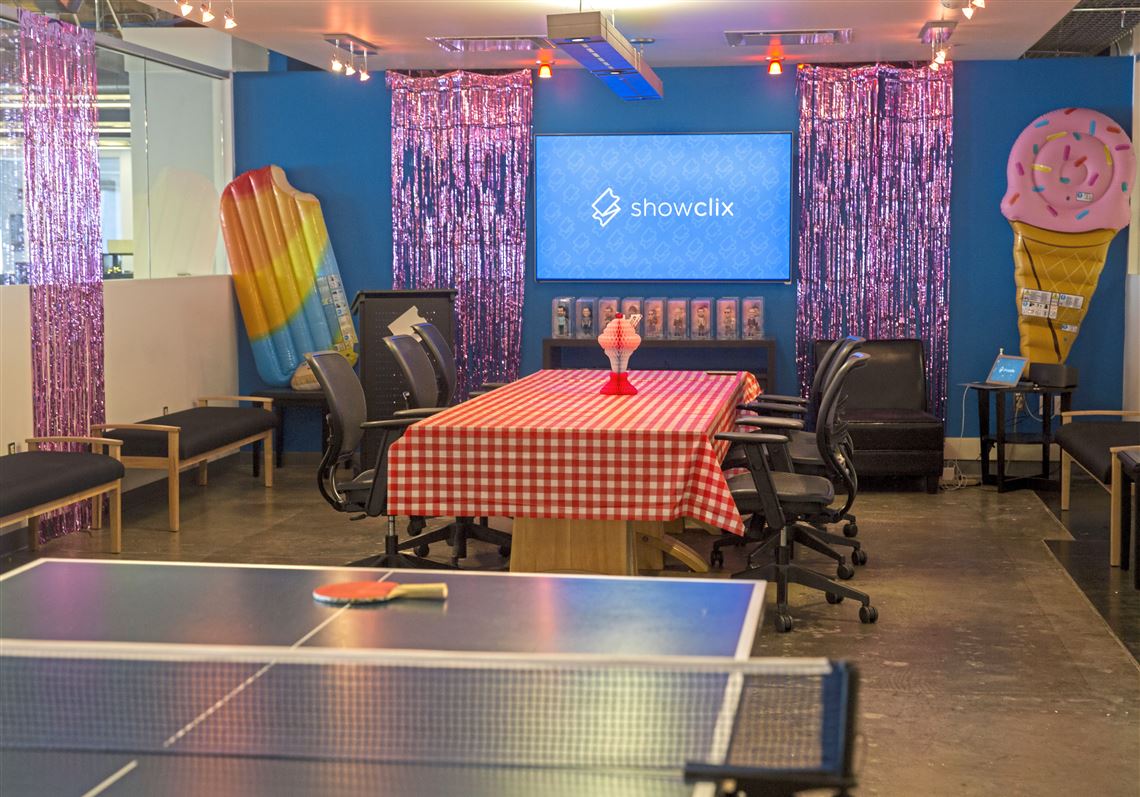Elevator doors open to reveal deep blue walls with the company name “ShowClix” projected onto them. Ping-pong tables are visible through the office’s glasses swinging doors.
“We’re a fun work environment,” said Amy Mrazek, director of marketing for the Downtown Pittsburgh-based digital event services company. “We want people to be at work, and on the days they are there we want them to have fun.”
But the company also allows it’s nearly 60 employees the flexibility to work from home.
“I can’t even imagine a tech company without working from home. It’s just part of our culture. I’m actually working from home today,” Ms. Mrazek said.
Despite some high-profile technology companies — notably Yahoo and IBM — moving to end their work-from-home policies, a number of top workplaces in Pittsburgh have found a balance between offering flexibility and encouraging face-to-face collaboration.
Although ShowClix employees work an average of two days per week from home, Ms. Mrazek said the company’s office space is designed to foster conversation on the days they report to the office. There’s even a “cereal wall” — yes, a wall covered in cereal options — in the cafe area.
“If you're coming into the office, you’re not just sitting at your desk all day,” Ms. Mrazek said.
Face-to-face collaboration was the impetus behind IBM telling its 2,600 marketing employees to return to the office, according to several reports earlier this year..
Local education technology startup Duolingo’s policy strikes a happy medium.
“The only real ‘rule’ is we ask people to be in by noon,” Christine Raetsch, whose title is “head of people” at Duolingo, said in an email. “The primary driver behind that guideline is we eat lunch together every day at 12:30. Lunch time is important both for team relationships and also for collaboration.”
Ninety-five percent of the East Liberty-based company’s 64 employees live in Pittsburgh, and Ms. Raetsch said employees work with their managers on the schedule.
“We prefer they come into the office as often as possible,” Ms. Raetsch wrote. “We’ve found that when teams are disbursed they just aren’t as effective as when they are together.”
Both tech companies — ShowClix established in 2007, and Duolingo in 2011 — instituted their policies from the start.
Lest you think working from home solely belongs to the tech culture, one of Pittsburgh’s mid-sized companies, as well as one of its largest companies each embrace a work-life balance.
Public policy research giant Rand Corp.’s North Oakland location employs nearly 230 people — more than half of them researchers who are able to work remotely.
“I’ve been here nine years, and I would say that we've always tried to strike a healthy balance,” said Jeffrey Hiday, director of media relations.
He said the flexibility is a main part of Rand’s culture. For those who do come into the office, the company has been incorporating open workspaces.
“We’ve been doing it to make sure people can increase the odds that they bump into other people,” Mr. Hiday said. “We try to make sure our coffee area is nice. We have reading nooks.”
One of Pittsburgh’s largest natural gas production companies — EQT — worked with its nearly 1,200 employees in 2009 to develop a “9/80” schedule to “balance workplace and home life responsibilities.”
EQT employees can work Monday through Thursday, from 8 a.m. to 6 p.m. and receive every other Friday off. On the Fridays they report to work, the day is shortened by an hour.
“Participation is voluntary,” said Charlene Petrelli, vice president and chief human resources officer of the Downtown-based company. “However, 87 percent of EQT employees participate. We also instituted ‘no meeting Fridays,’ which has increased productivity.”
The company also has seen an increase of employees who work remotely.
Ashley Murray: amurray@post-gazette.com; 412-263-1449 or on Twitter @Ashley__Murray
First Published: August 18, 2017, 4:00 a.m.
















